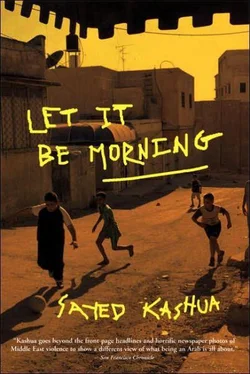I can see him now, standing at the entrance to the cemetery, his tape recorder playing the same songs, songs which used to be hits and nobody remembers anymore, waiting for the workers to finish the burial rites. Maybe he’ll manage to sell them some thurmus. In earlier times, he’d walk the streets all day, seeking out the crowds, the big events, pushing his green cart. His favorite sales spot was the soccer field. He’d show up not only at the Saturday games of the adult team but at all the practice sessions too, including those for the junior team.
I remember he never missed a single practice, not even of the junior team, when I was playing on it. I wasn’t exactly playing, I was signed up, and I came to every practice, always on time. I didn’t like soccer, but I treated it as another subject I had to excel at. Like math, or carpentry, or religion. The kids on the team said the only reason the coach agreed to take me was that he was afraid my father would get him fired. I could never find a partner when we were supposed to divide into pairs. The coach always had to force one of the kids to pair up with me. I’m not sure I was such a bad player, actually, but I hated those practice sessions, hated coming to the soccer field and hated the kids on the team. I didn’t want to upset my father by quitting. He always said, “Mens sana in corpore sano.” And he’d repeat it over and over again. I remember him telling me once, “Maybe you don’t run as fast as the others, maybe you don’t kick as hard as they do, but you’re smart and you should decide how the game is played.” But that’s bullshit. The best players were the ones who ran faster than everyone and kicked harder than everyone. They never invited me to play in the games that took place in the village. I was always on the bench, a backup, except I never got to replace anyone. But I had a team shirt, with the logo of a cement factory splashed across it. The factory belonged to the father of one of the kids on the team. The kids said they bet my father had had to buy me the shirt, but I didn’t take it to heart. I knew they were just jealous.
I remember that Saturday morning when the group was supposed to play its very first away game. Everyone was talking about how we’d be taking a bus to play against the Jews in a real junior league game. The coach ordered us to show up at the field at nine A.M. I got there first. The second to arrive was Thurmus with his cart. I kept my distance from him, and just went on observing him. If he comes closer, I thought, I’m out of here as fast as I can go. The coach and the minibus arrived before the rest of the team. I was the first to get on, wearing the red uniform of the team and regulation shoes. Slowly the bus started filling up. The coach asked me to get off for a minute, said he needed to talk to me. “Bring your bag with you,” he said. The coach explained that the minibus was too small and there wasn’t room for everyone, and the cement-factory owner had decided to come along too. “Next time we’ll take you along,” he said, and got on the bus. I managed to control myself, didn’t show a thing. I was about to explode but I didn’t say a thing. I could see the kids laughing from inside the bus, looking at me, and I knew they were talking about me, but I showed nothing, I kept it bottled up. Only when the bus drove off did I feel I couldn’t take it any more. My shoulders shook, and even though I tried hard not to cry, the tears just streamed down.
“This is for you,” I heard a voice from behind me. Thurmus was standing there with a cup in his hand. “Take it, it’s for you. Don’t cry. I’ve seen you play. You’re good. I’ve seen you.”
I look at Thurmus now, the only person who came to the funeral. I wait to catch his gaze, to see the big eyes following me. But no, his head is lowered and his big body is trembling.
The piles of garbage in our neighborhood are smaller than elsewhere, mainly because the neighborhood is at the edge of the village and a little less crowded than the ones in the center. But it’s still difficult to ignore the stench. Our sewage hasn’t clogged up yet, but it will soon. Women in dishdashes keep sweeping and cleaning their houses. I step up my pace as I walk toward my parents’ home. My wife and my brother’s wife are back from school already. Very few children came to class today, and the principals, who met with the mayor early in the morning, decided to send everyone home. Nobody dared to use the term strike for the day off they’d been forced to take. Nobody wanted to have to answer to the Ministry of Education later on.
My father is sitting in the yard. He has the chess set in front of him and is just about to arrange the pieces for a game. His cousin Salim will be arriving soon, as he does every morning. Everyone at home knows by now that the handing over of the workers hasn’t done the trick, and that the roadblock is still in place. My younger brother has gone back to sleep. My older brother is at the bank. My mother and her two sisters-in-law are in the kitchen peeling potatoes. I look at them, and see the pity in their eyes, because they know what happened and that I saw it all. I don’t have the strength to speak. I only tell them there’s no more water and that the sewage has begun overflowing in a few places, and that we shouldn’t use anything connected to the drainage system. I know they’re waiting for an explanation. This latest piece of news worries them. I go into the children’s room and spread out on my boyhood bed. I look at my brother, who’s only half asleep. Our eyes meet, but we don’t say anything. I can hear the women in the kitchen, amused at my mother’s announcement that from now on all peeing will be done in the yard.
The images rush by me in rapid succession — the workers in their underpants, the roadblock, the reverberating sounds, the shooting, the yelling at the rallies, the smell of garbage everywhere. Because of the heat, stifling by now for lack of air-conditioning, all the doors and windows in the house are open, letting in the filthy air.
I should be in my office right now. I’ve missed my final opportunity to get a story into the weekend supplement. I’ve got enough material for a big one. How I’ve missed writing full-length stories. The deadline for supplement stories is right now, Tuesday morning. They’re about to lay it out and this evening they’ll send it down to be printed. I wonder if the written media are as oblivious as the electronic ones to what has been going on. I suppose they are. If there’s been a gag order issued, it applies to all the media. I’m glad, actually, to know there may have been a gag order because it means no one will have written anything on the subject, and maybe I’ll get a chance to do a big spread next weekend.
I miss my chair, my workstation, my position. I miss the black coffee in the disposable cups, the secretary’s smile when I pass her on my way to the kitchenette. I even miss the shouting of the editor reminding me about my deadline. I miss the people I share an office with. I wonder what they’re thinking, if any of them have missed me, if they feel sorry for me. Everyone must know what’s going on here. Everyone must have seen the gag orders by now, delivered by fax and treated as sacred.
I wonder if any of them are concerned about me. I can picture them sitting around sipping their coffee, talking about me, laughing as they always do, making fun. I can picture the fashion writer who’s taken my spot, who uses my keyboard, my phone, my ashtray.
How I hate them now, how I hate myself for trying to believe I was really one of them, for trailing after them on lunch breaks, for trying to kid around with them, to make them laugh. I never managed to feel like I was one of them. They always made me feel like an outsider. I hate myself now for not doing a thing about it all this time, for letting things get this way. Didn’t I realize we’d find ourselves in a situation like this sooner or later? Not that I really know what kind of a situation this is exactly.
Читать дальше












